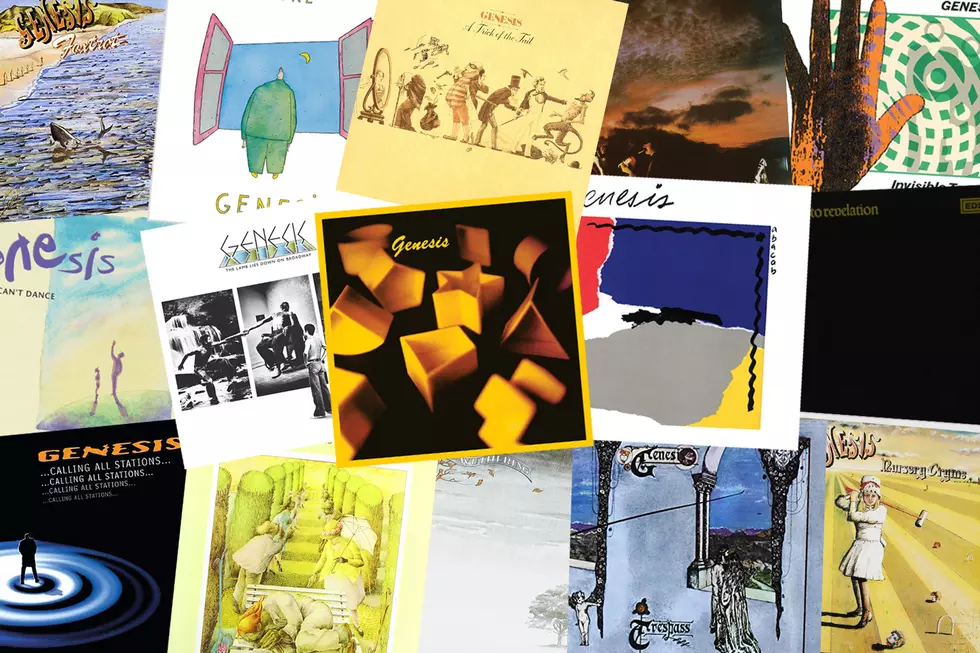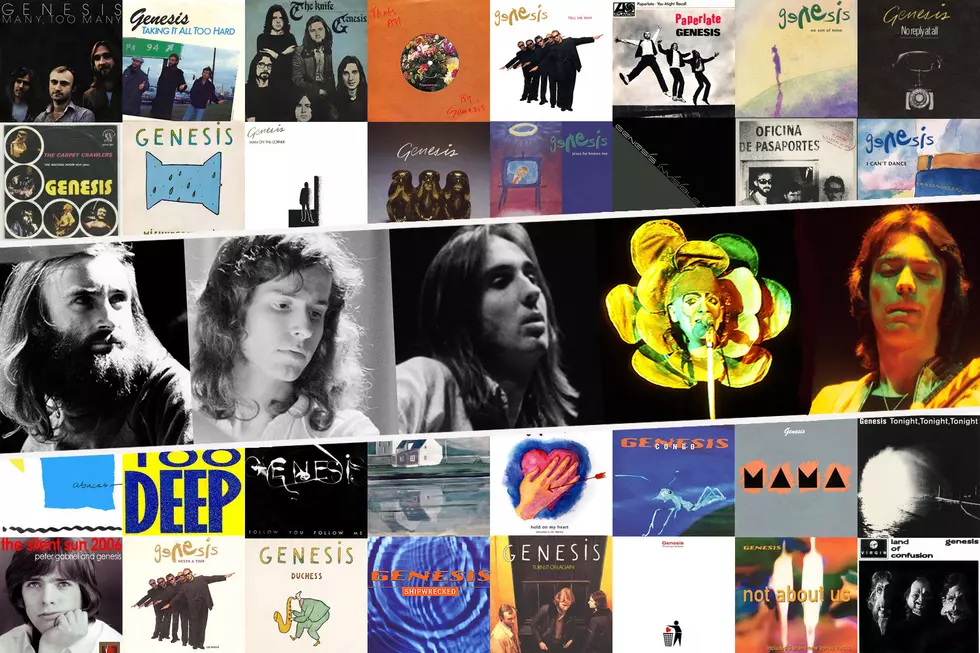
Underrated Genesis: The Most Overlooked Song From Each LP
Genesis were some variant of underrated at each point in their career.
In the proggier Peter Gabriel era, they were mostly a U.K. chart phenomenon, landing only two entries on the Billboard 200. And albums like The Lamb Lies Down on Broadway, built around a philosophical, phantasmagorical concept, were destined to divide critics.
Then as they evolved into a more streamlined, hook-oriented act with Phil Collins behind the mic, they faced a new category of negative feedback: Some original fans bemoaned the lack of 20-minute epics, and the stuffiest journalists cried "sell-out" at smooth hits like "Invisible Touch."
For the below list of Underrated Genesis: The Most Overlooked Song From Each LP, we aimed to consider the full scope of reception: commercial success, critical and fan response, even the band's own commentary.
"Am I Very Wrong?"
From: From Genesis to Revelation (1969)
It's hard to underrate any song from the Genesis album no one likes. Draped in cornball orchestrations and bogged down by awkward attempts at psychedelia, it offers only embryonic samples of the folk-prog style that would flourish on Trespass. "Am I Very Wrong?" is the closest thing here to a hidden gem, with Gabriel building daydream-y drama over a 12-string strum and Tony Banks' chiming piano.
"Looking for Someone"
From: Trespass (1970)
Most Genesis fans point to "The Knife" as the band's creative turning point. It's easy to understand why — the Hammond-heavy Trespass closer previews the more aggressive moments on Nursery Cryme. But opener "Looking for Someone" is a more fluid, emotionally satisfying piece, with Gabriel's scratchy vocal leading the band's build from wispy, soulful folk to pummeling battle-march prog. (For some puzzling reason, they played it live only five times, according to Setlist.fm.)
"Harlequin"
From: Nursery Cryme (1971)
With the exception of Steve Hackett, who loves the classic prog material enough to play it live decades later, the Genesis guys have been openly critical about much of their early catalog. In his 2014 memoir The Living Years, Mike Rutherford took a shot at his own tranquil 12-string ballad "Harlequin," calling it "pretty dodgy" and blasting his own imagistic lyrics. Uncalled for! Though it ranks far below the majestic, bookended epics "The Musical Box" and "The Fountain of Salmacis," "Harlequin" holds its own on Nursery Cryme, presenting a rare moment of calm amid the zaniness.
"Can-Utlity and the Coastliners"
From: Foxtrot (1972)
This one's easy based on process of elimination. Foxtrot is dominated, both in discussion and sheer length, by its closing, 23-minute powerhouse, "Supper's Ready." Steve Hackett's reflective, acoustic instrumental "Horizons" has become a live solo staple. And the first side is most famous for a pair of hard-hitting classics, "Watcher of the Skies" and "Get 'Em Out by Friday." That leaves us with two choices: the comparatively snoozy "Time Table" and the dynamic "Can-Utility and the Coastliners." The latter is the clear victor, highlighted by Gabriel's ascending vocal shouts, Banks' ghostly mellotron and a 12-string-powered arrangement that nimbly slides from bright to dark. "Those who love our majesty, show themselves!" Gabriel sings. Right here, buddy.
"The Battle of Epping Forest"
From: Selling England by the Pound (1973)
Inspired by a newspaper account of a gang skirmish in the titular London woodland, the comical and musically winding "Battle of Epping Forest" is one of the most polarizing tracks from Gabriel-era Genesis. On one hand, old-school fans savor the extended synth solo and the band interplay; others take issue with the frontman's overstuffed lyric sheet and cartoonish vocal tics. It's best to think of Gabriel's voice like an instrument on this 12-minute behemoth, which remains overshadowed by the similarly widescreen "Firth of Fifth," "Dancing With the Moonlit Knight" and "The Cinema Show."
"It"
From: The Lamb Lies Down on Broadway (1974)
As a sprawling conceptual double-LP crammed with interludes and connective tissue, The Lamb Lies Down on Broadway is designed to be experienced in full. But that's probably not feasible when you're driving to the post office, so centerpieces like "In the Cage" and "Back in N.Y.C." are likely your de-facto "singles," leaving behind a wealth of weird treasures. All of the deep cuts are worth dusting off, but let's go with "It," the resounding closer to this 94-minute masterpiece. While Hackett is often underutilized on The Lamb, his processed guitar hooks anchor this piece, adding a flash of raw energy to an album often defined by ambiance.
"Entangled"
From: A Trick of the Tail (1976)
A rare writing collaboration between Banks and Hackett, the atmospheric "Entangled" was technically released as a single. But it's become somewhat buried over the years: played only 61 times by the band (and not following the Trick of the Tail tour) and rarely offered the same glowing accolades as the melancholy "Ripples" or heavy rockers like "Squonk." But it's one of Hackett's finest moments, pairing fairy tale-styled words with a glorious acoustic slow build.
" … In That Quiet Earth"
From: Wind & Wuthering (1976)
Genesis reached peak jazz-fusion on the instrumental " ... In That Quiet Earth," essentially the middle section of a three-part suite also including "Unquiet Slumbers for the Sleepers ... " and the more famous grand finale "Afterglow." Though credited to all four members, it's dominated by Hackett's sublime sustain and choppy melodic patterns.
"Burning Rope"
From: … And Then There Were Three …
On their first trio LP, Genesis aimed to be more concise — partly because they felt they'd done enough epics already, partly in order to squeeze more songs onto a track listing. One example is Banks' melodic, keyboard-heavy "Burning Rope," which was originally a longer, more complex piece — along the lines of Wind & Wuthering's "One for the Vine" — before he scaled it back. "I decided to kind of abbreviate it and not make it quite such a long thing," he said in an interview for the 2007 Three reissue. It's the best of both worlds: a bit more digestible for pop-minded fans, still full of numerous musical twists.
"Man of Our Times"
From: Duke (1980)
It's bizarre that Genesis never played "Man of Our Times" on the Duke tour. The song was seemingly built to blow up even bigger onstage, drawing most of its intensity from Collins' primal drums, Rutherford's clean, chiming electric guitar and a series of belted high notes on the choruses, which solely consist of the title and some "oh oh"s tossed in for good measure.
"Another Record"
From: Abacab (1981)
Why "Another Record," the album's soulful, cyclical closer? "'Cause you knoooooow you like it." (Also, if you pick the nagging New Wave oddity "Who Dunnit?," you're just being difficult on purpose, much like Genesis were on that song.) They never played "Another Record" live, which is a shame — Collins' deceptively tricky drum part and Banks' piano hook could have sounded even huger with their full live band. But it's a charming little song anyway — an often-ignored close to an underrated LP.
"Just a Job to Do"
From: Genesis (1983)
"Home by the Sea" and "Second Home by the Sea" are live staples, even up through the 2007 reunion tour. "That's All," "Illegal Alien" and "Mama" were charting singles. So that leaves three clear "underrated" choices on Genesis: the sparkly "Silver Rainbow," the atmospheric song of hope "It's Gonna Get Better" and the pounding "Just a Job to Do." The latter, with Rutherford's funky bass and a cinematic lyric exploring government surveillance, wins.
"Anything She Does"
From: Invisible Touch (1986)
There are eight tracks on the 13th Genesis LP, and five of them are singles. "Invisible Touch," "In Too Deep," "Land of Confusion," "Tonight, Tonight, Tonight" and "Throwing It All Away" were all high-charting Billboard hits — they're out of contention right off the bat. That leaves "Domino," a lengthy fan favorite played live 275 times, the Grammy-nominated instrumental "The Brazilian" and the perky deep cut "Anything She Does," which documents a lonely man's obsession with a centerfold star. The clash in subject matter and vibe only adds to the intrigue, but the relentless chorus is memorable enough on its own.
"Dreaming While You Sleep"
From: We Can't Dance (1991)
Some fans do give props to "Dreaming While You Sleep," a semi-rare venture into long-form art-rock from Collins-era Genesis. There are a few other proggy moments on We Can't Dance, including "Driving the Last Spike" and "Fading Lights," but we're giving the nod to "Sleep" — partly because they played it live only 32 times. While Rutherford's distorted guitar squeals are a bit dated 30 years later, it's still a dynamic track — exploding from a subdued drum machine atmosphere to a turbulent, arena-tailored chorus.
"The Dividing Line"
From: Calling All Stations (1997)
After Collins' exit, Banks and Rutherford unwisely carried on with a new singer (Scottish alt-rocker Ray Wilson) for a final LP that disappointed just about everyone: Calling All Stations landed in the murky netherworld between pure prog and pop-rock — neither flashy nor hooky enough to satisfy fans of any period. But there were flashes of instrumental brilliance, like on the eight-minute "The Dividing Line," powered by Banks' lightning crash synth and Nir Zidkyahu's Collins-like drum fills. The keyboardist looked back with a mixed review in 2019, telling Innerviews, "It has a great rhythm track, but lyrically, it’s a little bit simplistic. Melodically, it could have been better. But it was great fun to do the rhythm part. It has great drumming throughout, and particularly during the drum solo."
Genesis Solo Albums Ranked
More From 92.9 The Lake









